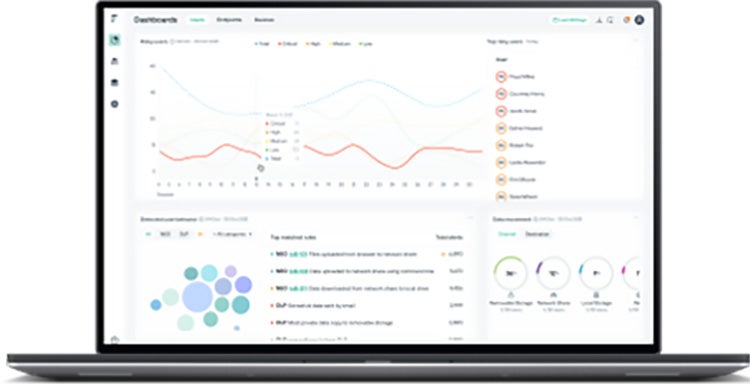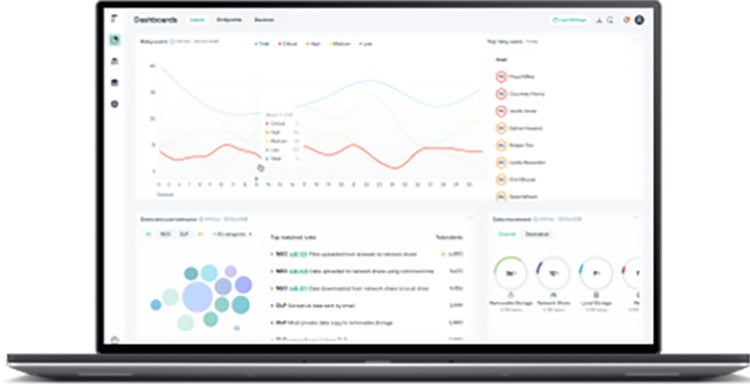
For CISOs and other security professionals, securing an organization’s critical data is vita 2024-4-8 19:20:11 Author: www.forcepoint.com(查看原文) 阅读量:7 收藏
For CISOs and other security professionals, securing an organization’s critical data is vital. Using data policy controls to protect regulated data, confidential information and other critical files is an important component of a robust cybersecurity strategy – but it doesn’t go far enough. To truly ensure that data is secure, your organization needs to understand who is accessing critical data and what they are doing with it.
Automate Data Security Based on Risky Behavior
Risk-Adaptive Protection – Automation built around Zero Trust
Extending Forcepoint’s award-winning DLP technology, Risk-Adaptive Protection employs continuous behavioral analysis to identify risky user behavior and to automatically adjust data policies to best counter potential risks. Monitoring (a key tenet of modern Zero Trust) and remediation occur automatically, in real time—risks to data integrity are dealt with swiftly and efficiently. This dynamic defense is designed to identify insider risk and other hard-to-spot data security risks without overloading security teams or placing excessive limitations on low-risk users.
Here's some benefits of Risk-Adaptive Protection's behavior-centric approach:
- It continuously asseses leve lof risk at the user level
- It enforces dynamic policies automatically according to that risk level
- It enables progressively stronger enforcement minimizes data security friction and false positives
- It allows for truly automated incident management

Risk-Adaptive Protection is a cloud-native solution that works by continuously assessing how users interact with data and assigning them individual risk scores. These scores are used to apply the appropriate responsive action based on the level of user risk when potential data loss is taking place. For instance, a user who simply demonstrates poor judgment may receive automated coaching or be flagged for auditing, while higher-risk users can trigger defensive measures such as encrypting data or even blocking user access.
Here's an illustration of how Forcepoint Risk-Adaptive Protection simplifies operations by automating policy enforcepoint through contextual security:

Higher accuracy, better user experience
This risk-based system dramatically reduces false positives to avoid interference with employee productivity and reduce security admin fatigue—saving time and cutting operating costs across the entire organization. It also enables security teams to rapidly initiate remediation procedures and provides admins with the information they need to take further action as necessary. The constant monitoring and reconstruction of user intent means a low-risk user who suddenly begins to exhibit risky behavior can be quickly identified and prevented from causing a costly data breach.
This video provides a quick overview of how Forcepoint Risk-Adaptive Protection works:
Tailoring DLP actions based on risky behavior delivers better business outcomes
Forcepoint Risk-Adaptive Protection constitutes part of a successful Data Security Everywhere approach that helps to simplify security. Organizations that use it can:
- Increase productivity by eliminating security friction that impedes the flow of business
- Cust costs by simplifying incident management and eliminating false positives that waste valuable employee time
- Reduce risk by automating enforcement to progressively adapt based on the risk each user presents
- Streamline compliance with privacy regulations through more accurate policy enforcement
Watch for more information soon about new offerings from Forcepoint in the SaaS area where Risk-Adaptive Protection brings even tighter integration with cloud-native DLP, improving incident alert management and supercharging Forcepoint data security.
And before we get to that, stay tuned for the final entry in our Data Security Everywhere blog series next week. It will cover AI-powered data discovery and classification.

Kevin Oliveira
Kevin serves as Senior Product Marketing Manager for Forcepoint’s Data Security products and solutions. He has over 20 years experience helping enterprises with their data and security initiatives with leadership positions at Dell EMC and IBM.
如有侵权请联系:admin#unsafe.sh